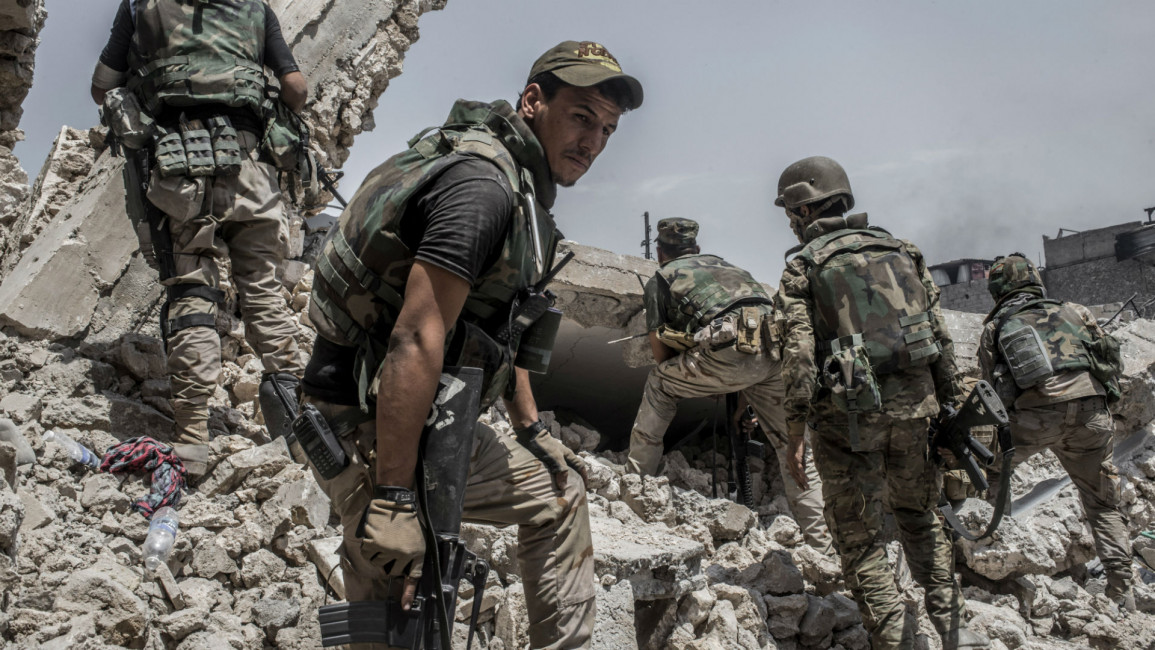Iraq forces clear last pockets of 'ghost-like' IS fighters in Mosul after premier declares victory
Iraqi forces fought to eliminate the last pockets of Islamic State group resistance in Mosul on Monday after the premier visited the devastated city to congratulate troops on securing victory.
With the jihadists surrounded in a sliver of territory in Mosul's Old City, attention was turning to the huge task of rebuilding the city and of helping civilians, with aid groups warning that Iraq's humanitarian crisis was far from over.
Prime Minister Haider al-Abadi visited Mosul on Sunday and hailed Iraq's "heroic fighting forces" after months of difficult battles that have left much of the city in ruins.
The Old City in particular has been devastated, with many buildings reduced to little more than concrete shells and rubble littering the streets.
Soldiers armed with machineguns and sniper rifles fired from atop ruined structures in the Old City on Monday, and air raids sent plumes of smoke rising over Mosul's historic centre.
A senior commander said on Monday that Iraqi forces were engaged in "heavy" fighting with the remnants of jihadist forces, but that the battle was near its end.
"The fighting is currently taking place with what seems like ghosts," Colonel Ahmad Kadhim told The New Arab on Monday.
"The city has been liberated but [IS fighters] are still hiding in between buildings and in basements. We need more time, they would rather die than surrender and most are wearing suicide vests, which they detonate once surrounded," Kadhim said.
He explained that the Iraqi military had waited several days to announce victory because of the massive devastation the offensive has caused the country's second city.
There are around 150 IS fighters, who are mainly foreign recruits, in the Old City mostly reduced to an area of the of about 200 by 100 metres.
Upon his arrival in the city the day before, Abadi's office said he was visiting "liberated" Mosul to congratulate troops on a "major victory".
Abadi later said that while "victory is certain", he was holding off on making a formal declaration "out of my respect and appreciation for our... forces that are continuing the clearing operation."
 |
The cost of victory has been enormous: much of Mosul in ruins, thousands dead and wounded and nearly half the city's population forced from their homes. |  |
Backed by the US-led coalition battling IS, Iraqi forces launched their campaign in October to retake Mosul, which was seized by the jihadists during the mid-2014 offensive that saw them take control of large parts of Iraq and neighbouring Syria.
Army, police and special forces, backed by waves of US-led air strikes, seized the eastern side of the city in January and launched the battle for its western part the next month.
The fight grew tougher when security forces entered the densely populated Old City on the western bank of the Tigris River, which divides the city, and intense street-to-street fighting followed.
The cost of victory has been enormous: much of Mosul in ruins, thousands dead and wounded and nearly half the city's population forced from their homes.
The United Nations has said 920,000 people fled their homes during the Mosul operation, and while some have returned the vast majority remain displaced.
"It's a relief to know that the military campaign in Mosul is ending. The fighting may be over, but the humanitarian crisis is not," Lise Grande, the UN's humanitarian coordinator in Iraq, said in a statement.
The UN refugee agency (UNHCR) on Monday said it could be many months before civilians are able to return to their homes.
"It is likely that thousands of people may have to remain in displacement for months to come," UNHCR said in a statement.



